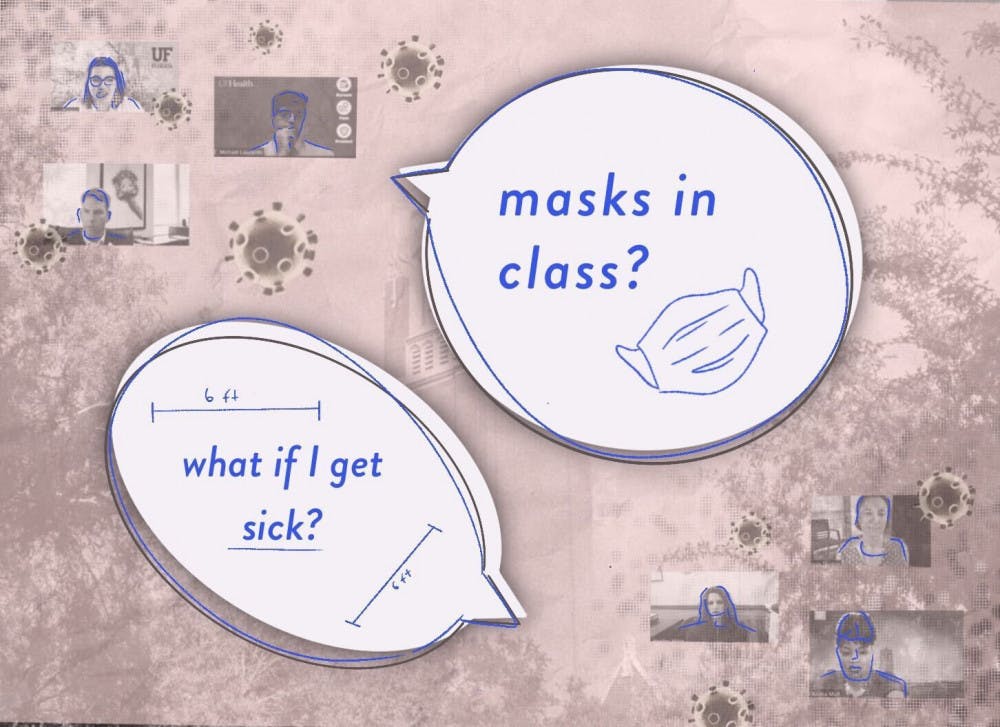
UF and UF Health officials discussed enforcing masks and protocols for when students get sick at a town hall on Thursday.
Out of nearly 5,000 UF students, almost one out of 10 said they do not wear masks, according to a survey by UF Division of Student Affairs. Those who answered said they believe masks to be an ineffective way of preventing the spread of COVID-19.
With the Fall semester just over three weeks away, instructors have been given the option to bar students from their classrooms if they refuse to wear a mask, administrators said in a town hall Thursday. Additionally, the university will not clear students to come on campus if they’re sick.
Students who refuse to wear a mask or face covering during class can be asked to leave, said UF Vice President for Student Affairs D’Andra Mull. This is the university’s recommended course of action to eliminate the risk to public health, she continued, but instructors must be the ones to ask the student to leave. They will also have the option to dismiss the entire class for that day, she added.
If the class is dismissed, the offending student will be required to complete an educational sanction through the UF Division of Student Affairs, which deals with violations of UF’s regulations, she said. The sanction would include making the student complete a seminar or assignment about the public health risks of not wearing a mask, she said.
If the student continues to refuse to wear a mask and refuses to complete the sanction, UF administration will take the “appropriate steps” to make sure they are not allowed back into the classroom again, she said.
This would warrant the student being officially withheld from campus, including from their in-person class and on-campus activities, she said. It is unclear what other measures UF will take to keep the student away from class.
“They cannot remain in the classroom setting and cause a threat to public health, the vice president said. “Not under any circumstances will we tolerate that.”
Mull said the UF Division of Student Affairs survey including nearly 5,000 students also found that 5 percent UF students do not wear a mask because they believe it affects their personal freedom. It is unclear when the study will be officially published, Mull said, and it is not publicly accessible because it was created with a team of five researchers who own the data and are preparing for a larger release.
For students returning to campus, they must take an online survey through UF’s Screen, Test & Protect program. Screening involves a questionnaire where students must record any COVID-19 symptoms they are experiencing, as well as indicate whether they have come in contact with someone who is confirmed to have the virus.
Students may then choose whether they’d like to be tested for the virus. The results from the survey will either clear a student to return to campus or prompt them to get tested for COVID-19.
When a student tests positive, whether through UF Health or another testing site, they should call the UF Health Screen, Test & Protect team, said UF Health epidemiologist Jerne Shapiro. The team will ask a student with positive test results to isolate and start contact tracing with UF Health’s team, she said. Then, their return to campus status will be changed to “withheld from campus.”
They will change someone’s status on their One.UF account if the student or faculty has received positive test results for COVID-19 or had contact with someone with positive results, she said.
If they are a faculty member, UF Human Resources will be notified, Mull said. If they are affiliated with athletics on campus, the UF Athletics Association will be notified as well. All changes in student statuses will be reported to UF’s Division of Student Affairs and any class roster they are enrolled in, she said.
Mull said the online status would not say the reason the student or faculty is not cleared to come back to campus to preserve their privacy. She said this status will let students and faculty know whether it is safe to engage with others before they step foot in a classroom.
The university will provide housing for students who need a place to isolate, said UF Dean of Students Heather White. UF has reserved 136 rooms on campus and 150 rooms in off-campus hotels for those testing positive for COVID-19, said UF Chief Operating Officer Charlie Lane in a meeting in June about reopening. Additionally, White said the university is planning to provide food delivery to students isolating off campus.
Administration will also offer Bystander Intervention Training for students who are not comfortable approaching someone and asking them to wear a mask or social distance, Mull said. It is unclear how or when this training will be offered.
They will also create short videos to inform students on the importance of face coverings, hand washing and physical distancing, she said.
“We are really going to make sure that we set up systems of success where students can be socially engaged, but physically distant,” she said.
Chris Hass, Associate Provost for Faculty and Academic Affairs, said there will be extra masks provided in classrooms for students who forget their masks or drop them between classes.
Students learning remotely will still have access to on-campus services through the Virtual Student Union, counseling services and student health care services, Mull said.
Michael Lauzardo, director of the UF Health Screen, Test & Protect program, said it is important to remember that protective measures are not perfect when done individually.
“All of those things individually are imperfect,” Lauzardo said. “But taken together, they represent the state of the art of how we can move through this together.”





